DEA to Hugo Chavez: "Find Your Own Trampoline"
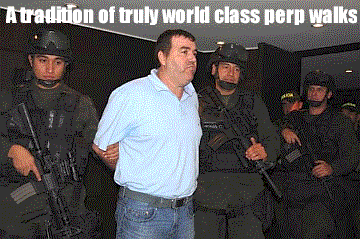 “We turned the whole damn country into an American battleship,” lamented the chairman of the House’s Western Affairs Subcommittee later. “We created the ‘USS Honduras.’”
“We turned the whole damn country into an American battleship,” lamented the chairman of the House’s Western Affairs Subcommittee later. “We created the ‘USS Honduras.’”
An investigation into the indictment for drug trafficking last month of a former crony of Venezuela’s President Hugo Chavez has revealed a case of “deja coup all over again."
Makled-Garcia is accused of being behind a drug move on May 10 2009 which ended in the fatal crash of a Jetstream 19-passenger turbo-prop airliner carrying 1.5 tons of cocaine, on Utila, one of the Bay Islands just off Honduras' northern coast.
"The flights from Venezuela came in every week," confirmed a resident of Utila, in an exclusive interview. "It's a small island; so the flights were an open secret."
"The operation paid off every official on the island, except one judge who told me, 'I'm the only one that doesn't take the envelope,'" said the Utila resident, who for obvious reasons asked that his name not be used.
The Utila resident corroborates elements of Wakled's indictment, but what he witnessed also raises new questions of whether critical details have been deliberately left out.
As the drug plane approached Utila, for example, its timing could not have been worse. One day earlier massive demonstrations had erupted in major cities across Honduras, protesting what turned out to be an imminent military coup.
A closer look at the incident illustrates a feature of the DEA's pronouncements; they are often also a poignant reminder of an old Biblical adage:
"There's nothing new under the sun.'
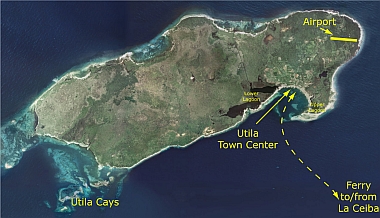 The Makled-Garcia indictment is significant because of its importance in the DEA's effort to build a case painting Hugo Chavez as the world's next Manuel Noriega.
The Makled-Garcia indictment is significant because of its importance in the DEA's effort to build a case painting Hugo Chavez as the world's next Manuel Noriega.
Syrian-born Walid Makled, 43, is characterized as "one of the two or three top narcotics traffickers in the world," in an indictment in which he is accused of just two specific overt acts.
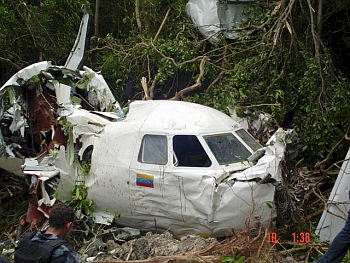 "People in bars came outside to watch the show."
"People in bars came outside to watch the show."
The Jetstream loaded with cocaine was not the only airplane circling in the dark over the island that night.
It crashed while attempting to evade a DEA plane trying to force it down.
“There was a large American airplane that sounded like it could be a C-130, or a P-3," said our source. "Later I heard it was from the DEA, and had been tracking the drug plane since it was first spotted approaching from over the Gulf of Mexico.”
A number of local island residents, amazingly, watched the whole thing go down.
"It happened on a Saturday night, and people came outside from every bar in town to watch the show," explained the resident. "It went on for a couple hours at least.”
"The American plane was lit up, and had a spotlight pointed at the Jetstream, which was running without lights. It was pretty clear that the pilot was desperately trying to find a way out.”
"Tell Chavez we flew into the middle of a coup."
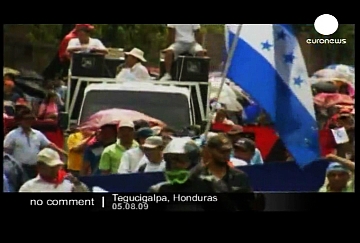 Since the drug business took off in earnest in the 1970’s, the Caribbean coast of Honduras has been a travel oasis on the drug trafficking turnpike, serving hot food and aviation fuel 24 hours a day.
Since the drug business took off in earnest in the 1970’s, the Caribbean coast of Honduras has been a travel oasis on the drug trafficking turnpike, serving hot food and aviation fuel 24 hours a day.
Pilots call it “The Trampoline.” Planes touch down, re-fuel, and then bounce back into the sky, ready for the second half of the flight to the U.S.
The reason is simple.
Honduras is located a comfortable distance for a twin-engined plane to fly on a full tank of gas from both Medellin Colombia and Miami Florida.
The grateful leaders of the Honduran military wouldn’t have it any other way.
“We forgot to pay off who?’
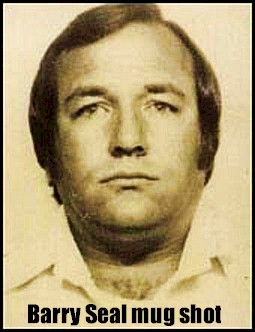 30 years earlier, the same circumstance faced by Walid Makled's Jetstream led to the December 10, 1979 arrest of legendary drug smuggler and CIA pilot Barry Seal.
30 years earlier, the same circumstance faced by Walid Makled's Jetstream led to the December 10, 1979 arrest of legendary drug smuggler and CIA pilot Barry Seal.
Seal had also been caught off guard by a military coup in Honduras. He had the misfortune to land his twin-engine plane in the immediate aftermath of the overthrow of then-Honduran President Juan Alberto Melgar.
Just a few miles from Utila, where the Jetstream crashed, Barry Seal was busted on the island of Roatan, carrying 40 kilos, a huge load of cocaine in those more innocent times.
The bust was front page news in the capital of Tegucigalpa.
"Barry paid off the wrong people,” a long-time Seal associate told us, in an interview for "Barry & the boys."
"He went to Ecuador to pick up the cocaine, and when he came back to Honduras a whole new set of Generals that he hadn't bribed were running the show."
How had that happened? Answer in a moment…
The Generals are still not amused
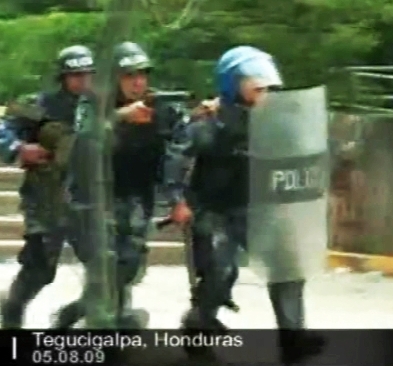 Meanwhile, here's how Walid Makled's "second overt act" went down:
Meanwhile, here's how Walid Makled's "second overt act" went down:
Manuel Zelaya, a friend of Hugo Chavez, had been elected president of Honduras several years earlier, defeating "Pepe Lobo," the unfortunately-named opposition candidate.
Zelaya, a populist, boosted the minimum wage 60 per cent, thrilling the country's agricultural workers, while earning the enmity of the "Big Banana" of the Honduran economy, the corporation which used to be called United Fruit.
Taking a play from Venezuela President-for-Life Chavez's playbook, Zelaya announced a national referendum to approve a new political constitution allowing him another term.
On the day before the Jetstream arrived over Honduran airspace, a constitutional crisis erupted, when the Honduran Supreme Court declared Zelaya's decree illegal.
The streets of Tegucigalpa, and other urban centers, erupted in violent protests, the army went on high alert, and moved in to quell the demonstrations.
It was the kick-off to a slow-rolling coup which culminated when troops rousted Zelaya out of bed in his pajamas in the middle of the night, unceremoniously dumping him on a plane out of the country.
When the Jetstream arrived, previous arrangements were already no longer considered binding.
If things were to continue to run smoothly, there were new people to pay off.
And they hadn't been.
Deposed General Barry Seal bribed offered no refund
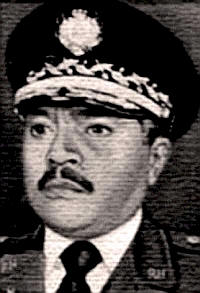 What happened to President Melgar: He was overthrown while in the U.S. for medical treatment.
What happened to President Melgar: He was overthrown while in the U.S. for medical treatment.
The chief of the Honduran branch of INTERPOL used Melgar's absence to imprudently announce that he had proof that top Honduran military leaders were involved in international cocaine trafficking.
The military men running Honduras were not amused. Changes were made.
The Honduran branch of INTERPOL's personnel suffered unexpected attrition.
The branch's indiscreet chief was arrested for slander. And Melgar was deposed.
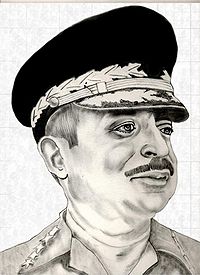 Honduras' military head, General Paz Garcia, soon to become notorious, promised he would order an investigation of the allegations. But apparently something came up, because he never did.
Honduras' military head, General Paz Garcia, soon to become notorious, promised he would order an investigation of the allegations. But apparently something came up, because he never did.
Unlike Melgar, Paz Garcia was a keen supporter of Nicaragua's Anastasio Somoza.
The CIA took "a close and friendly interest" in the coup, wrote Alex Cockburn in Whiteout: The CIA, Drugs & the Press."
This was probably not coincidental.
Until running into the unpleasantness of being deposed, the General who Barry Seal had bribed, General Melgar, had been planning to run for the presidency again in 1980.
He had even written a little ditty praising himself to sing on the campaign trail called "The Ballad of President Melgar"
It's one of those songs which will never been sung. Here is the opening verse:
Let me tell you about a friend
Who knows how to govern this land
He's a help to the poor peasants
Though a general so fine and grand.
Although the song shows promise of heading right to No. 1 on the Honduran Hot Parade, you know what happened next.
"I'm the only one that doesn't take the envelope"
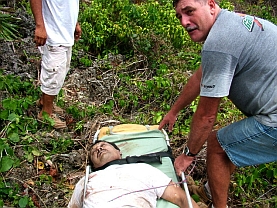 A small island with a population of just 1900 people, Utila has only two industries of any consequence:
A small island with a population of just 1900 people, Utila has only two industries of any consequence:
Scuba diving and drug smuggling.
"You can hear airplanes landing in the middle of the night at the airport, usually twice every week,” stated our source on the island.
“It's like clockwork. On Tuesday they fly in from Venezuela, and on Friday they refuel on their way back."
So when the Jetstream went down, some people headed out to the airport, to see for themselves how the island's major industry was faring. “But I didn't go," said our source.
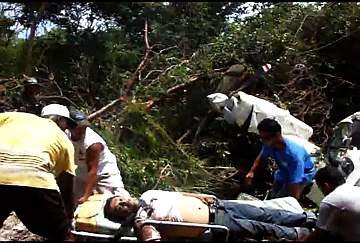 "When people get curious and go out to the airport to investigate, there are usually police waiting. They shoot a couple of bursts from their automatic weapons, more than enough to scare away the curious.”
"When people get curious and go out to the airport to investigate, there are usually police waiting. They shoot a couple of bursts from their automatic weapons, more than enough to scare away the curious.”
At the crash site, police discovered the body of the pilot, Fernando Bejarano Hernandez, 50, tangled in the wreckage. He became one of the 60 or so Colombian drug pilots killed in the past two years when planes they were flying crashed or were shot down.
Pilot Bejarano is collateral damage in the war on drugs. He doesn't look like much of an outlaw, or an adrenaline junkie, or even a swashbuckling "soldier of fortune." Maybe he was forced to make a difficult choice, between doing what's right and feeding his family.
Bruised but not seriously injured, two other men who had been onboard were also taken into custody.
Why DEA's Statements Not Always Strictly True
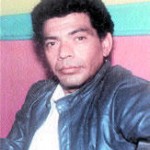 Barry Seal languished in prison in Honduras until raising enough money–$500,000–to win his release from General Paz Garcia.
Barry Seal languished in prison in Honduras until raising enough money–$500,000–to win his release from General Paz Garcia.
This probably came as no thanks to Juan Ramon Matta Ballesteros, the key financier behind what even then was being called the Honduras "Cocaine Coup."
Matta-Ballesteros was just then the world's biggest cocaine trafficker. He would probably have little use for upstart Barry Seal.
Under Paz, the Honduran army and intelligence service received a cut of Matta-Ballesteros' profits in return for protection, as Honduras became a major shipment route for cocaine and marijuana from Colombia.
Today it still is.
 Back then, Matta Ballesteros was known as the CIA's 'boy' in Central America.
Back then, Matta Ballesteros was known as the CIA's 'boy' in Central America.
Perhaps for this reason, the name of the best-selling book and movie about the hunt to find and kill the world's biggest Drug Lord, when it was written, was not titled "Killing Juan Matta Ballesteros."
It was called "Killing Pablo."
Pablo Escobar was never the world's biggest Drug Lord. Not even close.
When the US Drug Enforcement Administration set up its first office in Tegucigalpa in 1981, the Resident Agent "rapidly came to the accurate conclusion that the entire Honduran government was deeply involved in the drug trade," wrote Cockburn.
The office was closed. The DEA agent was sent home.
The Colombian Pilot's Mafia
All three men on the crashed Jetstream belonged to what is known as Colombia's Pilot Mafia.
The group is led by Juan Ramirez, AKA 'Asylum.'
Ramirez has at least 40 pilots who work exclusively for him, usually ambitious young pilots recruited from the numerous flight schools clustered around Villavicencio, a mid-sized Colombian city set on the plains, called llanos, which are a mountain range away from the capital of Bogotá.
The Pilot's Mafia flies cocaine belonging to one of Colombia’s major drug traffickers, Daniel “El Loco” Barrera, who is unique in Colombia. El Loco brokers cocaine for both warring Colombian factions, the FARC and the so-called Self-Defense Forces.
So it is impossible to say with any certainty whether the cocaine on the Jetstream belonged to the FARC, or to Colombia's ex-president Alvaro Uribe & al.
Meanwhile "El Loco" has been in the news. Two weeks ago Colombian police seized 3 tons of cocaine as well as 25 kilograms of heroin that authorities said he was preparing for shipment to Honduras. It was the largest seizure in the northern Colombian port city of Barranquilla this year.
We would be willing to wager those weren't Alvaro Uribe's drugs. But we have no way of knowing for certain.
If the DEA does, they aren't saying, which says a lot, all by itself.
While media reports paint a dizzying picture of the drug trade as a business roiled by murder, constant change, & the up-and-down fortunes of the drug capo du jour, these two snapshots of the drug trade taken 30 years apart show something else.
They don't show how much the drug trade has changed, we don't think.
They show how much it's stayed the same.
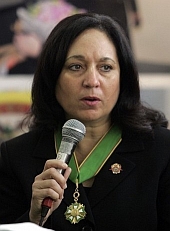 When DEA acting administrator Michele Leonhart called Syrian-born Walid Makled “a foreign drug kingpin with a long history of drug trafficking, who has built a vast global drug trafficking empire,” she was engaging in hyperbole that would make a carnival huckster blush.
When DEA acting administrator Michele Leonhart called Syrian-born Walid Makled “a foreign drug kingpin with a long history of drug trafficking, who has built a vast global drug trafficking empire,” she was engaging in hyperbole that would make a carnival huckster blush.
Then, as if no one had ever heard the DEA lie about how Pablo Escobar supplied 70% of America's cocaine, Leonhart said, “His arrest will impact worldwide supplies of drugs.”
“Well, he was arrested four months ago,” drolly noted one U.S. observer. “And we’re all still waiting.”